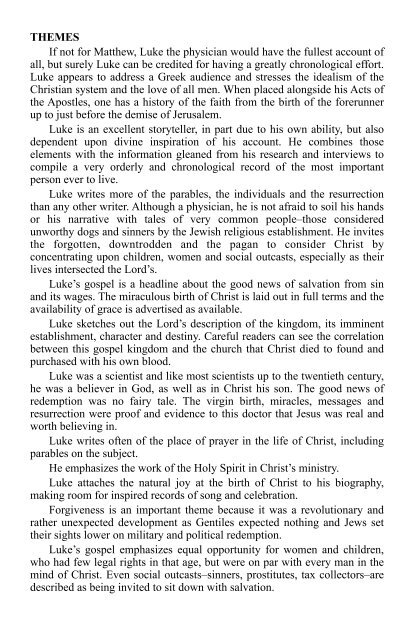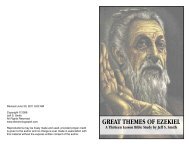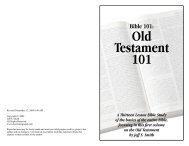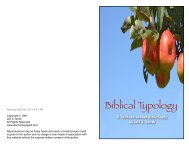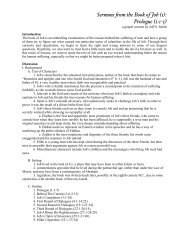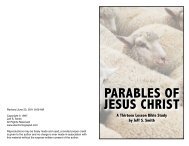New Testament Study Guides - ElectronicGospel
New Testament Study Guides - ElectronicGospel
New Testament Study Guides - ElectronicGospel
Create successful ePaper yourself
Turn your PDF publications into a flip-book with our unique Google optimized e-Paper software.
THEMES<br />
If not for Matthew, Luke the physician would have the fullest account of<br />
all, but surely Luke can be credited for having a greatly chronological effort.<br />
Luke appears to address a Greek audience and stresses the idealism of the<br />
Christian system and the love of all men. When placed alongside his Acts of<br />
the Apostles, one has a history of the faith from the birth of the forerunner<br />
up to just before the demise of Jerusalem.<br />
Luke is an excellent storyteller, in part due to his own ability, but also<br />
dependent upon divine inspiration of his account. He combines those<br />
elements with the information gleaned from his research and interviews to<br />
compile a very orderly and chronological record of the most important<br />
person ever to live.<br />
Luke writes more of the parables, the individuals and the resurrection<br />
than any other writer. Although a physician, he is not afraid to soil his hands<br />
or his narrative with tales of very common people–those considered<br />
unworthy dogs and sinners by the Jewish religious establishment. He invites<br />
the forgotten, downtrodden and the pagan to consider Christ by<br />
concentrating upon children, women and social outcasts, especially as their<br />
lives intersected the Lord’s.<br />
Luke’s gospel is a headline about the good news of salvation from sin<br />
and its wages. The miraculous birth of Christ is laid out in full terms and the<br />
availability of grace is advertised as available.<br />
Luke sketches out the Lord’s description of the kingdom, its imminent<br />
establishment, character and destiny. Careful readers can see the correlation<br />
between this gospel kingdom and the church that Christ died to found and<br />
purchased with his own blood.<br />
Luke was a scientist and like most scientists up to the twentieth century,<br />
he was a believer in God, as well as in Christ his son. The good news of<br />
redemption was no fairy tale. The virgin birth, miracles, messages and<br />
resurrection were proof and evidence to this doctor that Jesus was real and<br />
worth believing in.<br />
Luke writes often of the place of prayer in the life of Christ, including<br />
parables on the subject.<br />
He emphasizes the work of the Holy Spirit in Christ’s ministry.<br />
Luke attaches the natural joy at the birth of Christ to his biography,<br />
making room for inspired records of song and celebration.<br />
Forgiveness is an important theme because it was a revolutionary and<br />
rather unexpected development as Gentiles expected nothing and Jews set<br />
their sights lower on military and political redemption.<br />
Luke’s gospel emphasizes equal opportunity for women and children,<br />
who had few legal rights in that age, but were on par with every man in the<br />
mind of Christ. Even social outcasts–sinners, prostitutes, tax collectors–are<br />
described as being invited to sit down with salvation.


